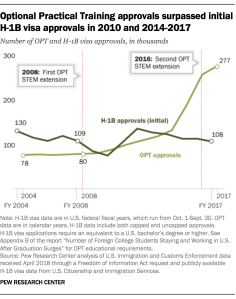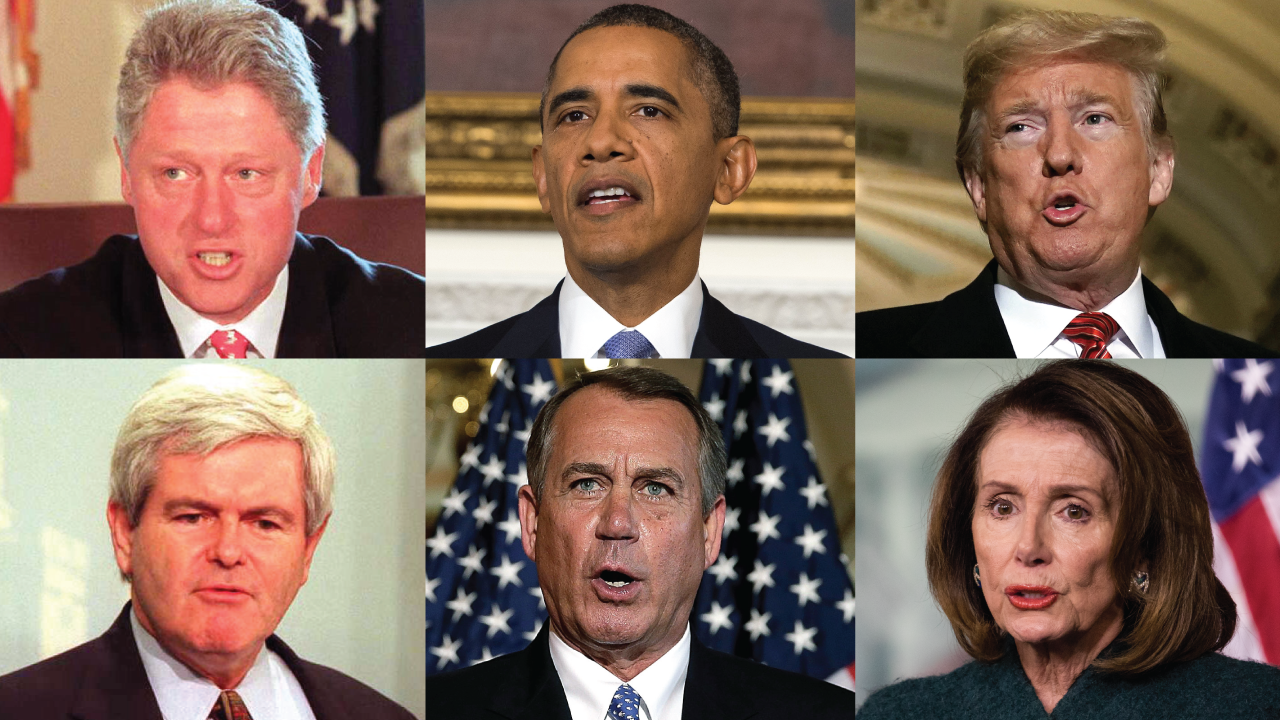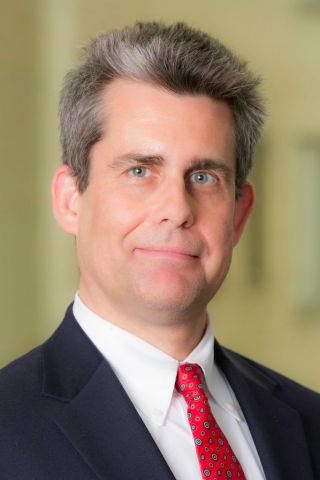

Like so many issues in the United States these days, the partial shutdown of the federal government – now the longest in U.S. history – is viewed very differently by people in different partisan and ideological camps. In a new Pew Research Center survey, about six-in-ten U.S. adults (58%) call the shutdown a “very serious problem.” But Democrats and Democratic-leaning independents are far more likely than Republicans and Republican leaners to say this (79% vs. 35%). And within the GOP, 47% of moderate and liberal Republicans consider the shutdown a very serious problem, but only 27% of conservative Republicans do.
About six-in-ten Americans (61%) disapprove of President Donald Trump’s handling of negotiations over the shutdown. An almost equal share (60%) disapproves of Republican congressional leaders on this score, and 53% disapprove of how Democratic leaders in Congress are performing. Other recent polls have asked who Americans believe is most responsible for the shutdown, finding that Trump and congressional Republicans bear more responsibility than the Democrats.
Such findings are broadly similar to what polls found during and after past closures: Americans really don’t like it when the federal government shuts down – even though relatively few people say they’re directly affected, and who bears political responsibility for the closed museums, darkened offices, furloughed workers and data delays varies depending on the circumstances of each shutdown.
All told, there have been 15 government shutdowns since 1980, when a change of legal interpretation began requiring federal agencies to cease regular functions when temporary funding gaps occurred. Most such shutdowns lasted only a few days at most, but some have been lengthy enough to cause major disruptions in government operations.
Here’s a look at public opinions about some of the more significant prior shutdowns, gathered from an archive of polling data maintained by the Roper Center for Public Opinion Research at Cornell University.
Oct. 6-8, 1990
President George H.W. Bush and the Democratic-controlled Congress clashed on a plan to reduce the deficit, leading to a three-day shutdown. While 87% of people in a CBS News poll conducted during the shutdown said they weren’t personally affected by it, they were split almost evenly about whether or not they were concerned they would be personally affected by it (47% said yes, 46% no). The poll asked who was more to blame for “the recent difficulties in dealing with the budget deficit”: 54% said Bush and Congress were equally to blame, 32% said Congress alone and 5% said Bush.
Nov. 14-18, 1995
Two shutdowns occurred in 1995, both triggered by disputes between President Bill Clinton and the Republican-controlled Congress on how to balance the budget. In a CBS News poll taken shortly after this first, five-day shutdown had ended (with a temporary deal), only 11% said they’d been personally affected by it, versus 88% who said they hadn’t been, findings that mirrored other polls at the time. Nonetheless, many more Americans were concerned by the shutdown: In a Gallup poll taken as it began, 11% called it a crisis and 40% said it was a major problem; 33% said it was a minor problem, and 14% said it wasn’t a problem at all.
In general, polls showed that Congress took more political heat for the shutdown than Clinton. In an NBC News/Wall Street Journal poll, for instance, 47% said Congress was more to blame for the shutdown, 27% said Clinton was and 20% volunteered both equally.
Dec. 16, 1995-Jan. 5, 1996
Until the current standoff, this 21-day shutdown had been the longest in U.S. history. Despite the length of the shutdown, a Pew Research Center survey conducted shortly after it ended found only 16% of people saying they or a family member had been “personally inconvenienced” by the shutdown – and only 7% called it a major inconvenience. An overwhelming majority (84%) said the shutdown had had no impact on them. Other surveys taken during and after the shutdown had similar findings.
Nonetheless, in an ABC News/Washington Post poll taken just after the shutdown ended, three-quarters of Americans called the shutdown “a bad thing,” and nearly half that group (36% of all respondents) went so far as to call it a “crisis.” (About a quarter, or 23%, said the shutdown had been “a good thing.”)
As for who bore the most responsibility for the shutdown, that same ABC/Post poll put more burden on the Republicans than Clinton: Half said Republicans, 27% said Clinton and 20% volunteered both.
Oct. 1-16, 2013
This 16-day shutdown stemmed from House Republicans’ attempts to either undo large parts of the Affordable Care Act or repeal the law entirely. Polls taken at the time found considerable public anxiety about the shutdown. A Pew Research Center survey, for instance, found 57% saying they were very concerned about the shutdown’s effect on the economy, which was still recovering from the Great Recession; 26% said they were somewhat concerned. In a CNN/ORC International poll taken shortly after the shutdown began, 49% called the shutdown a major problem, with 18% going further and terming it a crisis. (Around one-in-five, or 18%, said it was a minor problem, and 14% said it was not a problem at all.)
In an NBC News/Wall Street Journal poll taken about a week into the shutdown, 31% said they or someone in their family had been affected by it “in terms of employment, services, or benefits,” versus 68% who said they hadn’t been affected. The same poll had 46% calling the shutdown an “extremely serious” problem, with 27% more calling it “quite serious.” (Another 18% said “just somewhat serious” and 9% said “not that serious.”) And 34% said the shutdown was doing “a great deal” of harm to the economy, along with 31% saying “quite a bit” of harm. (Around one-in-five, or 21%, said “just some” harm, 10% said “very little” and 2% said no harm at all.)
In an ABC News/Washington Post poll taken just after the shutdown ended, 78% of people said they had not been personally inconvenienced by it; 11% each called it a major or a minor inconvenience. Nonetheless, 71% said they disapproved strongly of the shutdown, and 10% said they disapproved somewhat; 9% each said they either approved strongly or approved somewhat. As for assigning responsibility, 53% said Republicans were mostly responsible for the shutdown, 29% said Obama and 15% volunteered both.
Shortly after the shutdown began, 38% saw Republicans as being more to blame for it, 30% said the Obama administration was and 19% volunteered both equally in a Pew Research Center survey. Views had shifted somewhat in a follow-up survey a week later, when 46% said Republicans were more responsible, 37% said the Obama administration and 13% volunteered both equally.
Jan 20-22, 2018
The current shutdown is actually the third of the Trump administration. The first was this three-day closure sparked by disagreement between congressional Democrats and Republicans over immigration policy. There was little public support for the shutdown: 84% of respondents in a Quinnipiac University poll taken during the shutdown said it was mainly unnecessary, with only 13% calling it mainly necessary.
The Quinnipiac poll also found that the public spread responsibility for the shutdown among Democrats (32%), Trump (31%) and Republicans (18%). A Fox News poll taken during and after the shutdown had similar results: 32% said Democrats were mostly responsible, 24% said Republicans, 24% said both equally and 13% said Trump (the latter two were volunteered responses).
